The Life and Times of Monica Puig
By Nina Pantic Jul 23, 2020Monica Puig shares that she's pregnant with a baby girl
By Ed McGrogan Feb 02, 2025Carlos Alcaraz, Frances Tiafoe to join Monica Puig for March 2025 exhibition in Puerto Rico
By Baseline Staff Dec 17, 2024Monica Puig completes Ironman Puerto Rico triathlon in personal-best time
By Baseline Staff Mar 20, 2024WATCH: ATP players in Rotterdam dish on who they love most on tour for Valentine's Day
By Baseline Staff Feb 14, 2024"We don't stop for holidays!" Merry Christmas from all your favorite players
By Baseline Staff Dec 25, 2023Monica Puig says farewell in San Juan exhibition with Venus Williams
By Baseline Staff Sep 17, 2023WATCH: Monica Puig and DJ Mad Linx take Miami on My Tennis Life
By Baseline Staff Apr 22, 2023Monica Puig, Jennifer Brady toast Women’s History Month in Miami
By Baseline Staff Mar 22, 2023Monica Puig has a lot left to give and there's plenty on the horizon for the Puerto Rican pioneer
By Mitch Michals Feb 27, 2023The Life and Times of Monica Puig
She became the first Puerto Rican to ever win Olympic gold. In the four years since, Monica Puig has experienced even more monumental highs and lows.
Published Jul 23, 2020
Advertising
Every week, Monica Puig has been opening the door into her everyday life a little bit wider. She journals, makes TikToks, does Peloton workouts and experiments with at-home facials, all for more than just herself.
“I’m very transparent,” says Puig, a co-star of Tennis Channel’s My Tennis Life digital show—which in the age of the coronavirus could be rebranded as My Actual Life. “I’m very honest with how my life is, and I’m just like everybody else.
“My life is no different from a normal person’s life. I like to bake and cook. I clean. I go to bed early. I read books.”
Still, it’s impossible to watch an episode or scroll through Puig’s Instagram (@monicaace93)—to miss the most extraordinary part of her life: she’s an Olympic gold medalist.
Not only that, but when Puig climbed to the top of the medal podium in 2016, she became the first Puerto Rican to ever win gold. Photos from the historic achievement are hung in her Miami apartment and scattered throughout her social media. There’s one of her gripping her medal with tears in her eyes; one of her jumping for joy; another of her waving the Puerto Rican flag.
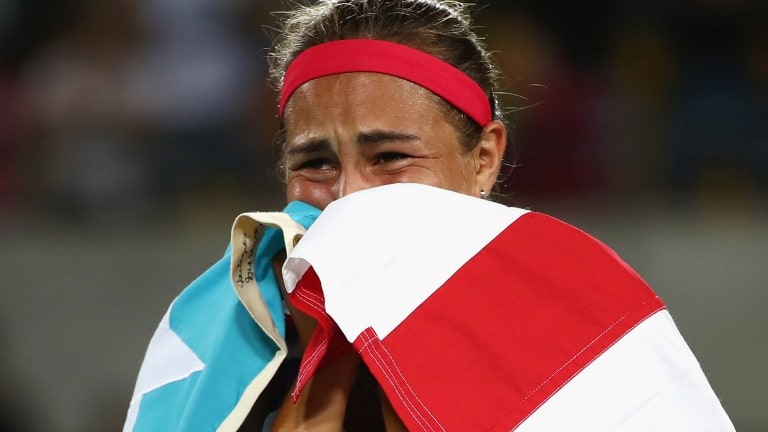
The Life and Times of Monica Puig
© Getty Images
Advertising
The postponement of the 2020 Tokyo Olympic Games will allow the Puerto Rican to properly recover from elbow surgery. (Getty)
Her six wins in Rio de Janeiro, including three-set victories over Petra Kvitova in the semifinals and Angelique Kerber in the final, catapulted Puig from nominal fame to superstardom, and made her an icon at home.
“The fact that Puerto Rico has a Hall of Famer and an Olympic gold medalist is kind of crazy when you think about it for such a little island in the Caribbean,” says Hall of Famer Gigi Fernandez, who has also won Olympic gold. Though born in San Juan, Fernandez won her two gold medals in doubles while representing the United States.
Before Rio, Puig had put together a respectable start to her professional career: a WTA title in 2014, six ITF crowns and a ranking near the Top 30. In 2016, she reached the final in Sydney and three other WTA semifinals. But no one could have fathomed such a miraculous performance on the quadrennial stage.
“It was a surreal moment in my life and in my career, and sometimes I don’t even believe that it happened,” the 26-year-old says. “But you just kind of have to just soak it all in, because it actually did.
“It was the most precious moment that I’ve ever had, and sometimes I need to take [the medal] out just to confirm that it was real.”
If she needs any further confirmation, Puig can look no further than her hip, where she has a tattoo of the Olympic rings, or at her dog, Rio.
“I named her Rio to commemorate making my first Olympic team for the first time,” Puig says. “It just turned out that two weeks later when I came back home, I was the Olympic champion. Rio will always remind me of the most spectacular moment in my life.”
While Puig has yet to scale similar heights on the court in the years since—she hasn’t been inside the Top 40 since January 2017—her off-court pursuits have been equally if not more commendable. When Puerto Rico was devastated by Hurricane Maria in September 2017, Puig answered the call.
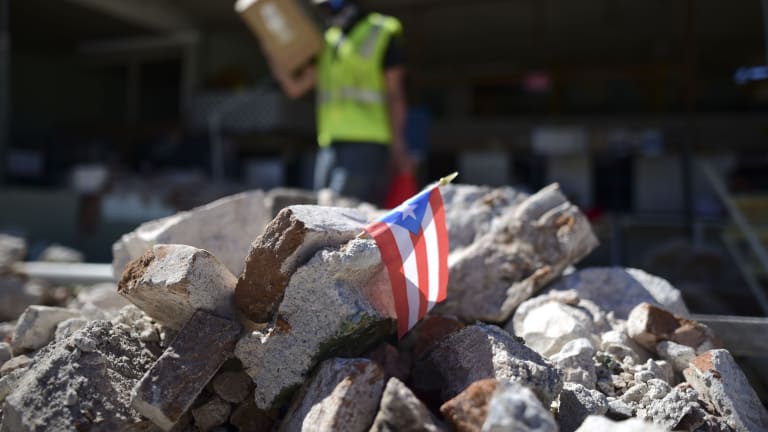
The Life and Times of Monica Puig
© AP
Advertising
Puerto Rico was hit hard by Hurricane Maria in 2017. (AP)
The hurricane made landfall as a Category 4, causing billions in damage, leaving 3.4 million residents without electricity and killing thousands. While still competing in Asia, Puig started an online fundraiser which raised over $150,000, and then flew back home with Maria Sharapova to personally aid in the relief efforts.
“Tennis is known for being an individual, almost selfish sport,” Puig wrote in an essay announcing the fundraiser. “At one point, I was so focused on my results this year and how I was struggling. I won the Olympics in 2016 and now I’m at rock bottom, but then all of a sudden something like Hurricane Maria happens and it gives you a reality check.”
“It was the worst tragedy to fall on Puerto Rico in our generation,” the 56-year-old Fernandez says. “We’re still suffering. It’s been over two years, but people are still living under tarps with no roofs and the electric grid is still very sketchy.”
As the reigning Olympic champion, Puig harbored a unique platform, which she took advantage for the good of her battered nation.
“It really gave me an opportunity to help Puerto Rico during one of its neediest times,” she says. “After Hurricane Maria, I was able to use the voice that I created by winning the Olympics and get the needs and the concerns of Puerto Rico out there for the world to hear. And thankfully, they all came to Puerto Rico’s aid.”
From the Caribbean to Australia to Africa, and everywhere in between, professional athletes have long been raising money and awareness for those who need it most. These eye-opening experiences can benefit the athletes as well, and it did for Puig.
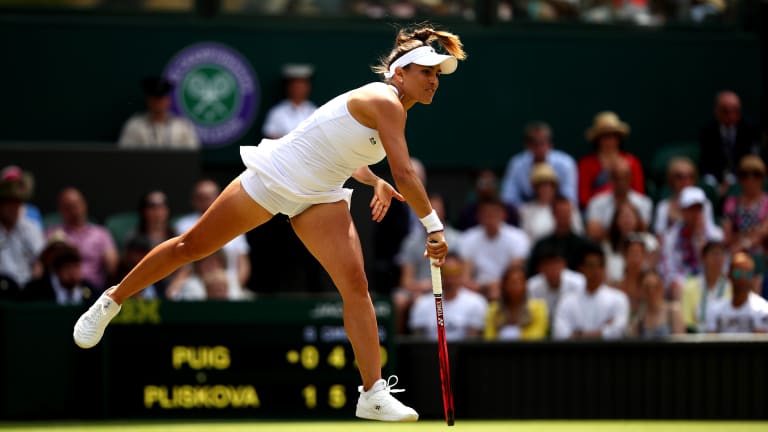
The Life and Times of Monica Puig
© Getty Images
Advertising
Puig reached the fourth round of Wimbledon in 2013. (Getty)
“She was very young when Hurricane Maria happened,” Fernandez says. “To have that kind of experience in life when you see human suffering firsthand—some people never see it. She saw it and it changed her. She put it to positive use, that’s what’s important. She really gave back and spent a lot of time and energy in it.”
No crisis has been as big of a reality check, though, as the coronavirus pandemic.
“For a place that’s dealt with so much hardship, adding another thing is tough,” Puig says.
Puerto Rico has yet to fully recover from Hurricane Maria—or from earthquakes that hit the island at the start of 2020. The island has its own Olympic team, but as it is a American territory, it should have been receiving disaster recovery aid from the U.S. Political complications and delays have made it difficult for relief to reach Puerto Ricans.
“We’ve been hit with a lot of different things and it’s been pretty sad,” Puig says. “But we just all have to stay as positive as possible to try and get through all these hardships.”
Though a full-time Miami resident, Puig was born in San Juan, and her heart breaks with every struggle her island goes through.
“Everybody’s always going to say, because I speak English so well or because I live in the States [that I’m not Puerto Rican],” Puig says. “But I always make it very clear that I am 100 percent Puerto Rican. I identify as a Puerto Rican. I’m very proud of my heritage. I’m very proud of where I come from.”
“Puerto Ricans are very passionate,” Fernandez says. “We are very proud of our heritage, even if we’re not born on the island or raised on the island.”
In Puerto Rico and beyond, Puig’s heightened public status came with heavy responsibilities and put her under a microscope—none of which she was prepared for.
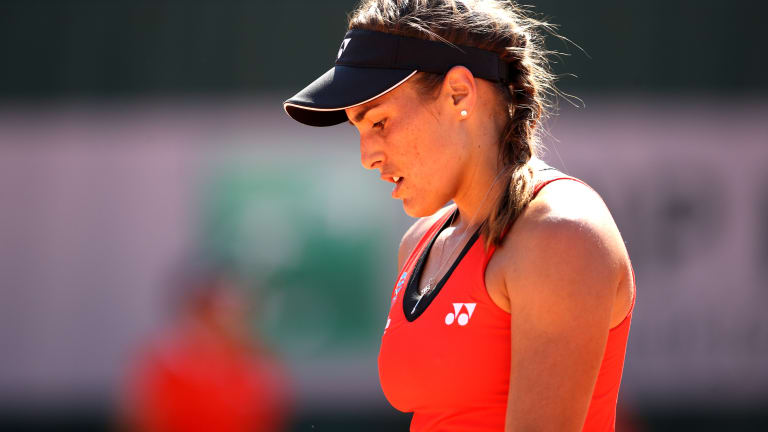
The Life and Times of Monica Puig
© Getty Images
Advertising
The 26-year-old is currently ranked No. 90 in the world. (Getty)
In October 2019, for Noah Rubin’s Behind the Racquet web series, Puig revealed a battle with depression.
“It’s probably been the hardest three years that I’ve ever faced in my entire life,” she wrote. “There is trauma after winning something that major that pushes you flat on your butt.
“I had an entire country watching me, which was extraordinary, but they didn’t see the darker side. As I became more upset, I saw that depression was inevitable when it was tough to get out of bed.
“At one point you’re on the top of the world and all of a sudden it ends, and you just don’t know what just happened. It’s like whiplash.”
In accepting her struggle, Puig, with the help of Olympians that reached out, realized that others shared her feelings and experiences. It helped change her perspective and turn a mental corner. She even literally hit refresh online, as her 500,000 Instagram follower discovered an empty feed.
“I feel like these past couple of years have really helped me mature and grow into the woman that I am today,” she says. “And thankfully, because of that I feel more empowered in my life, and I’m able to go about things that normally would scare me or that would push me into being sad.”
As Puig began enjoying tennis again, she hit a physical roadblock. In December, she underwent surgery on her right ulnar nerve that sidelined her at the start of 2020, pushing her ranking almost outside the Top 100. Her injury hiatus lasted into the most unexpected roadblock of all: the COVID-19 tour shutdown.
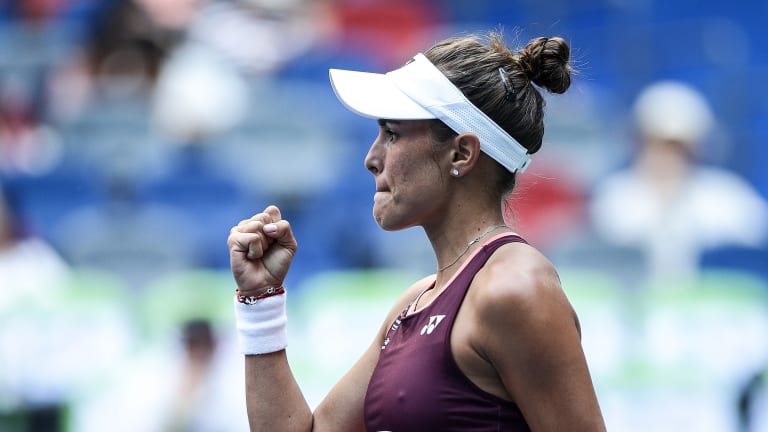
The Life and Times of Monica Puig
© Getty Images
Advertising
Puig is competing for the Las Vegas Rollers this World TeamTennis season. (Getty)
“You can’t put the lives of athletes or even spectators at risk,” she says of tournament cancelations. “It’s not right. It’s not ethical. You have to just think of the community and the world, more than just an event.”
In March, when Japan and the International Olympic Committee announced that the Tokyo Games were being postponed to 2021, Puig wasn’t crushed. She was also excited to have more time to get back to peak playing form as she was rehabbing.
“Going to the Olympics was always in the plans, but my health is definitely the most important thing at the moment,” she says. “I don’t know if I was going to be 100 percent ready to compete, but thankfully now I have a little bit more time to just kind of regroup and get myself back there.”
The pandemic has given everyone, including Puig, a new perspective. From Olympic tennis champions to 9-to-5 workers, it is a shared experience in a new normal.
“The only difference is that we work on a tennis court instead of in an office,” Puig says. “But we are just human beings trying to live our best lives just like everybody else.”
If feeling normal is what helps drive a happy and healthy Puig onward to whatever comes next, then that’s what she’ll be—even as her name forever remains synonymous with gold.
“I’m always going to be an Olympic champion,” Puig says. “That’s the great part about it, is that I have that title to my name, and it will always be there, whether I win another Olympics or not.”